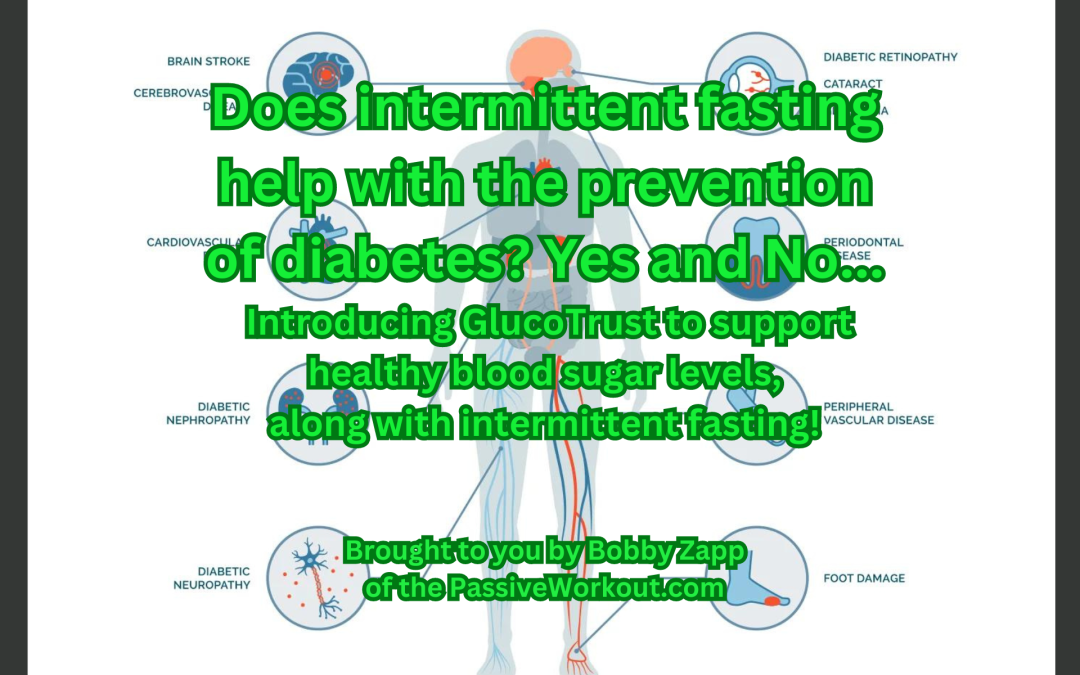First let’s look at the Center for Disease Control and Prevention, National Diabetes Statistics on the Report Estimates of Diabetes and Its Burden in the United States.
How many people actually have diabetes in the United States?
Here’s the Fast Facts on Diabetes from the CDC:
Source from: https://www.cdc.gov/diabetes/data/statistics-report/index.html
Diabetes
- Total: 38.4 million people have diabetes (11.6% of the US population)
- Diagnosed: 29.7 million people, including 29.4 million adults
- Undiagnosed: 8.7 million people (22.8% of adults are undiagnosed)
Prediabetes
- Total: 97.6 million people aged 18 years or older have prediabetes (38.0% of the adult US population)
- 65 years or older: 27.2 million people aged 65 years or older (48.8%) have prediabetes
Results
Prevalence of Both Diagnosed and Undiagnosed Diabetes
Among the US population overall, crude estimates for 2021 were:
- 4 million people of all ages—or 11.6% of the US population—had diabetes.
- 1 million adults aged 18 years or older—or 14.7% of all US adults—had diabetes (Table 1a; Table 1b).
- 7 million adults aged 18 years or older who met laboratory criteria for diabetes were not aware of or did not report having diabetes (undiagnosed diabetes, Table 1b). This number represents 3.4% of all US adults (Table 1a) and 22.8% of all US adults with diabetes.
- The percentage of adults with diabetes increased with age, reaching 29.2% among those aged 65 years or older (Table 1a).
- Table 1a. Estimated crude prevalence of diagnosed diabetes, undiagnosed diabetes, and total diabetes among adults aged 18 years or older, United States, 2017–2020.
The United States clearly has an issue with 38.4 million people of all ages that have diabetes, and these statistics prove that point.
This article was written to help people Prevent and Manage Diabetes Through Exercise, Fasting, And Eating A Healthy Diet.
And I ask the question: Does Intermittent fasting Help with The Prevention of Diabetes?
The answer is: “Yes and No.” Well, let me answer that right now.
Intermittent fasting does have an impact on preventing diabetes, but it’s multifaceted and can yield both positive and negative outcomes.
While intermittent fasting can potentially improve insulin sensitivity and reduce the risk factors associated with type 2 diabetes, such as obesity and inflammation, its effectiveness may vary depending on individual factors like lifestyle, genetics, and overall health status.
Thus, while intermittent fasting may offer benefits in diabetes prevention for some individuals, it may not be as effective or suitable for others.
The key lies in understanding one’s unique circumstances and consulting with healthcare professionals to determine the most appropriate approach to diabetes prevention.
My research has taken me down the rabbit hole of Preventing and Managing Diabetes Through Exercise, Fasting, And Eating A Healthy Diet. The intermittent fasting is critical in the “Prevention of Diabetes” in this scenario, because it has many advantages, both short-term and long-term. Here are some of the key effects:
- Changes in Insulin Levels: Fasting can lead to lower insulin levels in the bloodstream, allowing the body to access stored fat for energy. This is helpful with weight loss and improving insulin sensitivity overall.
- Cellular Repair Processes: During fasting, the body initiates cellular repair processes such as autophagy, where cells remove damaged components and recycle them for energy. This can promote longevity and reduce the risk of certain diseases.
- Gene Expression and Hormone Regulation: Fasting can alter the expression of genes related to longevity and protection against disease. It also affects the secretion of various hormones such as growth hormone and norepinephrine, which can have metabolic and health benefits.
- Metabolic Changes: Fasting can lead to metabolic changes such as increased ketone production, which occurs when the body burns fat for fuel instead of glucose. This can have therapeutic effects on conditions like epilepsy and may improve brain function.
- Inflammation Reduction: Some studies suggest that fasting may help reduce inflammation in the body, which is linked to various chronic diseases such as heart disease, cancer, and Alzheimer’s disease.
- Improved Heart Health: Fasting has been shown to improve several risk factors for heart disease, including blood pressure, cholesterol levels, and triglycerides.
- Brain Health: Fasting may promote the growth of new nerve cells and protect the brain against neurodegenerative diseases like Alzheimer’s and Parkinson’s disease. It may also improve cognitive function and mood.
Overall, fasting can have profound effects on the body’s physiology and may offer numerous health benefits when done correctly and under appropriate supervision.
Conversely, individual responses to fasting can vary, and it’s essential to consider factors such as overall health, nutritional status, and medical history before incorporating fasting into your routine. It’s always advisable to consult with a healthcare professional before starting any fasting regimen, especially if you have underlying health conditions or concerns.
If you want to get better control of your blood sugar levels, and enhance your overall well-being, and enjoy restful nights of sleep? GlucoTrust™ might be the answer you’ve been searching for.
Okay, let’s define the two types of diabetes:
Diabetes is a chronic health condition that affects how your body turns food into energy. The stages of diabetes vary based on the type of diabetes in question.
Here are the general stages for the two most common types,
Type 1 and Type 2 diabetes:
Type 1 Diabetes
Diabetes is typically diagnosed in children and young adults, where the body does not produce insulin.
Onset Stage:
- The body’s immune system mistakenly attacks and destroys insulin-producing cells in the pancreas.
- Symptoms may not be immediately apparent.
Diagnosis:
- Typically occurs after symptoms arise, which can include increased thirst, frequent urination, hunger, fatigue, and blurred vision.
- Diagnosis is confirmed through various blood tests.
Management:
- Involves daily insulin administration, blood sugar monitoring, and careful meal planning.
- Regular medical check-ups are essential.
Advanced Management (if needed):
- Advanced treatments like insulin pumps or continuous glucose monitoring systems may be used.
Type 2 Diabetes
Type 2 diabetes is more common and occurs when the body doesn’t use insulin properly (insulin resistance), and later might not make enough insulin.
Pre-diabetes:
- Blood sugar levels are higher than normal but not high enough yet to be diagnosed as Type 2 diabetes.
- Lifestyle changes can prevent or delay Type 2 diabetes.
Early Stage:
Type 2 Diabetes:
- The body begins to resist the effects of insulin or doesn’t produce enough insulin to maintain a normal glucose level.
- Often goes undiagnosed because symptoms might be subtle.
Diagnosed Type 2 Diabetes:
- Confirmed through blood tests.
- Management includes lifestyle changes, oral medications, and sometimes insulin therapy.
Advanced Management:
- Involves intensive insulin therapy, possibly alongside other medications.
- Continuous health monitoring and management of potential complications.
Gestational Diabetes
There’s also gestational diabetes, which occurs during pregnancy. It usually goes away after the baby is born, but it can increase the risk of developing Type 2 diabetes later in life.
Common to All Stages:
- Regular monitoring and management of blood sugar levels.
- Lifestyle adjustments including diet, physical activity, and, if necessary, medication.
- Continuous care and regular medical check-ups to manage the condition and prevent complications.
It’s important to remember that while these are general stages, diabetes can vary greatly from person to person, and the approach to managing the condition should always be personalized and under medical guidance.
Introducing
Are you looking to take control of your blood sugar levels, enhance your overall well-being, and enjoy restful nights of sleep? GlucoTrust™ might be the answer you’ve been searching for.
This dietary supplement is designed to support healthy blood sugar levels and provide a range of additional health benefits.
Let’s delve into the details of what makes GlucoTrust™ a unique and valuable addition to your daily routine.
Balancing Blood Sugar Levels:
GlucoTrust™ is formulated to help you maintain balanced blood sugar levels.
High and unstable blood sugar can lead to a range of health issues, making it essential to regulate glucose effectively.
With the help of GlucoTrust™, you can keep your blood sugar levels in check, reducing the risk of diabetes and its associated complications.
Promoting Healthy Blood Flow:
Proper blood circulation is crucial for individuals dealing with diabetes. GlucoTrust™ contains premium natural ingredients that support healthy blood flow through your blood cells. This promotes optimal blood circulation, ensuring that your blood cells receive the nutrients and oxygen they need. This is essential in maintaining healthy blood sugar levels and preventing complications associated with poor circulation.
Blood Pressure Regulation:
High blood pressure often accompanies diabetes, making it essential to manage both conditions effectively. GlucoTrust™ Capsules help stabilize blood pressure and ensure regular blood flow to all your blood cells. By maintaining healthy blood pressure levels, GlucoTrust™ contributes to overall well-being and prevents the development of hypertension in diabetic individuals.
Boosting Metabolism:
Diabetes can have a detrimental impact on metabolic functions. GlucoTrust™ assists in reducing cravings for unhealthy foods, promoting both lipid and carbohydrate metabolism. By curbing your appetite for junk food, you can better control your blood sugar levels and maintain a healthy metabolic rate.
Restful Sleep:
Quality sleep is a crucial factor in diabetes management. Lack of sleep can exacerbate blood sugar issues. GlucoTrust™ helps users achieve a restful night’s sleep, which is essential for maintaining healthy blood sugar levels. Many users have reported improved sleep quality after incorporating GlucoTrust™ into their daily routine.
Enhancing Production:
As more individuals seek natural solutions for blood sugar regulation, supplements like GlucoTrust™ have become increasingly popular. GlucoTrust™ supports the maintenance of healthy blood sugar levels by promoting production.
Its core components are all-natural and carefully selected to provide effective support for individuals looking to manage their blood sugar levels.
Reducing Food Cravings:
Cravings for sugary and unhealthy foods are common triggers for diabetes. GlucoTrust™ Tablets specifically target these triggers. With its all-organic composition, GlucoTrust™ helps individuals reduce their intake of sugar and junk food. By managing these cravings, you can stabilize your blood sugar levels and support cardiovascular health.
GlucoTrust™ is an exceptional dietary supplement that not only assists with blood sugar control but also offers a range of additional health benefits.
Made in the USA in an FDA-approved facility, it adheres to the highest quality standards. This all-natural product is free of stimulants, artificial components, chemicals, and fillers, ensuring your health remains a top priority.
Don’t miss this limited-time opportunity to take control of your blood sugar levels and enjoy improved overall health. Choose from a range of special offers, all backed by a 180-day money-back guarantee. Take charge of your well-being with GlucoTrust™ – the natural solution for blood sugar management.
If you want to try Glucotrust click here
Next up
Preventing and managing the risk factors associated with diabetes involves adopting a healthy lifestyle and making positive choices, like exercising, fasting and eating a healthy diet.
Here are some actions you can take to prevent diabetes:
- Maintain a Healthy Diet:
- Consume a balanced diet rich in fruits, vegetables, whole grains, lean proteins, and low-fat dairy products.
- Limit the intake of sugary beverages, processed foods, and high-fat, high-sugar snacks.
- Control Portion Sizes:
- Be mindful of portion sizes to avoid overeating and manage calorie intake.
- Regular Physical Activity:
- Engage in regular exercise or physical activity for at least 150 minutes per week. This can include activities like brisk walking, jogging, swimming, or cycling.
- Incorporate strength training exercises at least two days a week.
- Maintain a Healthy Weight:
- Achieve and maintain a healthy body weight by balancing calorie intake with physical activity.
- Losing even a small amount of weight can significantly reduce the risk of developing diabetes.
- Monitor Blood Sugar Levels:
- If you have prediabetes or are at risk of diabetes, monitor your blood sugar levels regularly as advised by a healthcare provider.
- Stay Hydrated:
- Drink plenty of water throughout the day, and limit the consumption of sugary drinks.
- Reduce Stress:
- Practice stress-reduction techniques such as meditation, yoga, or deep breathing exercises to manage stress, which can impact blood sugar levels.
- Get Quality Sleep:
- Aim for 7-9 hours of quality sleep each night to support overall health and well-being.
- Limit Alcohol Consumption:
- If you choose to drink alcohol, do so in moderation, and be aware of its effects on blood sugar.
- Avoid Smoking:
- If you smoke, consider quitting, as smoking is associated with an increased risk of diabetes and related complications.
- Regular Health Check-ups:
- Schedule regular check-ups with a healthcare provider to monitor your overall health and assess diabetes risk factors.
- Know Your Family History:
- Be aware of your family’s history of diabetes, as genetics can play a role in diabetes risk.
- Education and Awareness:
- Educate yourself about diabetes risk factors, symptoms, and prevention strategies.
- Community Support:
Join support groups or community programs focused on healthy living and diabetes
If you want to try Glucotrust click here
Next up:
“Unlocking the Potential of Intermittent Fasting to Reverse Type 2 Diabetes”
Introduction:
In this insightful booklet, we explore the fascinating world of intermittent fasting and its profound impact on reversing type 2 diabetes. We delve into scientific studies, published in the Journal of Clinical Endocrinology and Metabolism, to uncover the transformative effects of intermittent fasting on metabolic health.
But before we dive into the studies, let’s set the stage by understanding the intricate connection between type 2 diabetes, metabolic health, and intermittent fasting.
The Common Scenario:
Imagine a 45-year-old individual, let’s call him John, who struggles with obesity. He visits his primary care physician for an annual checkup, and it becomes evident that he has gained 15 pounds over the past year.
The doctor recommends weight loss through calorie reduction and regular exercise. Despite good intentions, John gains even more weight over the next year and eventually receives a diagnosis of type 2 diabetes.
His doctor prescribes expensive diabetes medications, leading to discussions with pharmaceutical representatives like Jennifer.
One such drug making headlines is *semaglutide, known for its weight loss effects. This story is all too familiar in today’s world.
*Semaglutide is an antidiabetic medication used for the treatment of type 2 diabetes and an anti-obesity medication used for long-term weight management.
Metabolically Healthy Obesity:
We uncover the concept of “metabolically healthy obesity” (MHO), which challenges the assumption that weight gain causes sickness.
Surprisingly, 20% of obese individuals fall under the MHO category, characterized by normal metabolic function, low insulin levels, and longer lifespans. These individuals store excess energy in subcutaneous fat rather than ectopic fat in organs like the liver or muscle.
Metabolic Dysfunction Precedes Weight Gain:
Contrary to popular belief, metabolic dysfunction often precedes weight gain.
In fact, 80% of overweight and obese individuals experience metabolic issues before gaining weight.
High insulin levels and insulin resistance drive this process, leading to weight gain.
Even thin individuals can suffer from metabolic dysfunction, referred to as “thin on the outside, fat on the inside” (TOFI).
Ectopic Fat and Its Impact:
Ectopic fat storage in organs like the liver and muscle contributes to metabolic dysfunction. While fat is meant to be stored in fat cells (adipocytes), storing fat elsewhere leads to malfunctioning tissues. Understanding the degree of ectopic fat in the body becomes crucial, even though it remains hidden from view.
Semaglutide Study:
A study involving semaglutide, a weight loss drug, is explored. Notably, the study excluded participants with type 2 diabetes.
Despite this exclusion, semaglutide demonstrated significant improvements in waist circumference, blood pressure, hemoglobin A1C levels, and lipid levels among overweight or obese participants. The drug’s side effects were generally manageable, highlighting its safety.
Intermittent Fasting’s Impact:
The booklet discusses the profound similarities between exercise and intermittent fasting in terms of their effects on autophagy and mitochondrial health.
Both stimulate the body’s natural repair processes and enhance mitochondrial function, crucial for overall health.
Intermittent Fasting and Type 2 Diabetes:
We examine the role of intermittent fasting in improving insulin sensitivity and reducing the risk of type 2 diabetes. A randomized control trial in Australia showcases the effectiveness of intermittent fasting, with significant reductions in hemoglobin A1C levels observed within three months.
The Key Study:
A pivotal study involving 72 participants aged 38 to 72, all with type 2 diabetes of varying durations, is highlighted. Participants were divided into control and treatment groups, with the latter undergoing intermittent fasting with caloric restriction, termed “Chinese medical nutrition therapy.”
The primary outcome was diabetes remission, defined as achieving a hemoglobin A1C level of less than 6.5% for at least three months after discontinuing anti-diabetic medications.
Remarkable Findings:
The study revealed that 47% of participants in the treatment group achieved diabetes remission compared to only one person in the control group. Additionally, participants in the treatment group experienced significant weight loss (about 15 pounds) compared to minimal weight change in the control group. Importantly, after a 12-month follow-up, 44% of the treatment group participants maintained their remission, with a hemoglobin A1C level of 6.3%.
Reduced Medication Costs:
The booklet highlights the economic benefits, with medication costs in the treatment group being 77% lower than in the control group. Furthermore, 90% of participants, including those on anti-diabetes medications and insulin, reduced their medication requirements after intermittent fasting.
Challenge to Conventional Views:
The study challenges conventional beliefs by demonstrating that diabetes remission is not limited to those with e short diabetes duration.
Two-thirds of participants achieving remission had diabetes for more than six years, emphasizing the potential of interventions like intermittent fasting.
The Power of Lifestyle Choices:
In conclusion, this booklet underscores the power of lifestyle choices in improving metabolic health and potentially reversing type 2 diabetes. It reiterates the significance of addressing the root cause, which often involves consuming unprocessed, fiber-rich, and low-added-sugar foods, along with regular exercise and intermittent fasting.
These three pillars—exercise, fasting, and a healthy diet—are fundamental to achieving and maintaining metabolic well-being.
Unlock the potential of intermittent fasting in your journey towards better health.
Learn how it can transform your life and explore the science behind this powerful approach to managing and even reversing type 2 diabetes.
If you want to try Glucotrust click here!
“Understanding Blood Sugar Changes During Fasting”
Fasting typically causes blood sugar levels to fall, but sometimes they can rise due to hormonal responses.
When you eat, your body stores glucose as glycogen in the liver and as body fat for energy.
- During fasting, the body can release stored glucose back into the bloodstream to maintain energy levels.
- Counter-regulatory hormones, including noradrenaline, sympathetic nervous system, growth hormone, and cortisol, facilitate the release of glucose during fasting.
- The dawn phenomenon, a surge of these hormones in the early morning, prepares the body for the day by releasing stored glucose.
- Individuals with type 2 diabetes may experience higher blood sugar levels during fasting, but this is due to the release of stored glucose and is not necessarily a cause for concern.
- Fasting should not cause dangerously low blood sugar levels in individuals not taking diabetes medications, as the body can convert glycogen, body fat, and even proteins into glucose.
- For those on diabetes medications, fasting may require medication adjustments to prevent low blood sugar levels.
- Studies have shown that people on extended fasts with significantly reduced blood sugar levels often feel normal due to the brain’s use of ketones for energy.
- Temporary increases in blood sugar during fasting can indicate that the body has excess glucose to release and use.
- Overall, fasting can help regulate blood sugar levels and improve metabolic health when done correctly.
If you want to try Glucotrust click here!
Okay, I hope you learned some information that added value to your journey toward better health and wellness.
Keep an eye out for free information in your email. And again, if you have a question then email me at: healing@passiveworkout.com/ to “attention healing,” Okay—I hope you got some value from my powerful information. Good luck— and Peace, Health, and Juice!
Bobby Zapp the founder of the PassiveWorkout.com/
And the Holistic Healing Program.
And the author of: Bobby Zapp’s PassiveWorkout and
Bobby Zapp’s Super Green Juice Guide
If you want to try Glucotrust click here!
OPT-IN LINKS FOR ALL FREE OFFERS:
- Holistic Healing Overview: https://www.passiveworkout.com/holistic-healing-overview-a-b/
- All the book’s free resource giveaways:
https://www.passiveworkout.com/free-bonuses/
- Free cheat sheet:
https://www.passiveworkout.com/free-cheat-sheet-download/
- Join my Beta groups to help me develop my courses,
The PassiveWorkout Course or The Goal Setting life Plan Formula!
https://www.passiveworkout.com/courses/
Peace and Health













Recent Comments